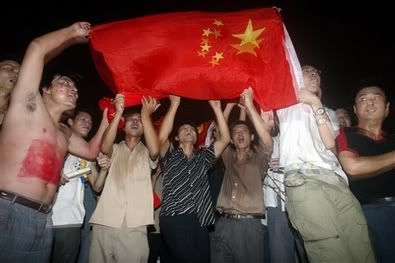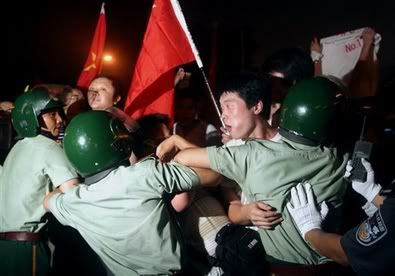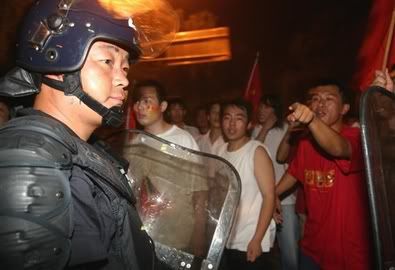In Soccer Loss, a Glimpse of China's Rising Ire at Japan
By JIM YARDLEY

 EIJING, Aug. 8 - The cheers thundered out of the grandstands of Workers Stadium on Saturday night, as the throng of fans with red-painted faces waved red Chinese flags and banged drums in one of the biggest games ever played in this soccer-addled nation.
EIJING, Aug. 8 - The cheers thundered out of the grandstands of Workers Stadium on Saturday night, as the throng of fans with red-painted faces waved red Chinese flags and banged drums in one of the biggest games ever played in this soccer-addled nation.
"Go! Go! Go!" they bellowed. "China's team! China's team! China's team!"
At different moments in the game, other chants arose from pockets of the crowd, directed at the small section of spectators dressed in blue for the opposing team, Japan.

Chinese supporters demonstrate outside Beijing's Workers' Stadium after Japan defeated China 3-1 in the Asian Cup soccer tournament final Saturday night, Aug. 7, 2004. Following the match, crowds chanting anti-Japanese insults broke bottles and exchanged kicks and punches with police outside the stadium. (AP Photo/Ng Han Guan)
"Kill! Kill! Kill!" the Chinese fans yelled. Or, echoing a patriotic song from another era, they shouted, roughly: "May a big sword chop off the Japanese heads!"

 EIJING, Aug. 8 - The cheers thundered out of the grandstands of Workers Stadium on Saturday night, as the throng of fans with red-painted faces waved red Chinese flags and banged drums in one of the biggest games ever played in this soccer-addled nation.
EIJING, Aug. 8 - The cheers thundered out of the grandstands of Workers Stadium on Saturday night, as the throng of fans with red-painted faces waved red Chinese flags and banged drums in one of the biggest games ever played in this soccer-addled nation.
"Go! Go! Go!" they bellowed. "China's team! China's team! China's team!"
At different moments in the game, other chants arose from pockets of the crowd, directed at the small section of spectators dressed in blue for the opposing team, Japan.

Chinese supporters demonstrate outside Beijing's Workers' Stadium after Japan defeated China 3-1 in the Asian Cup soccer tournament final Saturday night, Aug. 7, 2004. Following the match, crowds chanting anti-Japanese insults broke bottles and exchanged kicks and punches with police outside the stadium. (AP Photo/Ng Han Guan)
"Kill! Kill! Kill!" the Chinese fans yelled. Or, echoing a patriotic song from another era, they shouted, roughly: "May a big sword chop off the Japanese heads!"
An international soccer match is never a place for the faint of heart. But the insults aimed at the Japanese team during the Asian Cup soccer tournament, held in China this year, are being called the latest example of a strain of rising anti-Japanese nationalism among many younger Chinese that seems increasingly volatile.
The Saturday night Asian Cup final did little to soothe that animosity. Japan won 3-1, though television replays suggested a that Japanese player illegally hand-touched the ball on his team's controversial second goal. After the game, police officers scuffled with Chinese fans after they pelted the Japanese team's bus with bottles.
But an overwhelming majority of fans left the stadium dazed and silent, some even weeping.
"I'm so upset we lost to Japan," said one young man with a Chinese flag draped over his head. "That's the thing I most didn't want to see happen."
The controversy began earlier in the tournament when Japan played preliminary games in Chongqing, China's wartime capital. Chinese fans booed the Japanese team throughout the games and remained seated during the Japanese national anthem. Japanese news media reported that hostile Chinese fans surrounded the Japanese team's bus after one game.
Later, when the Japanese team played its semifinal game, in the city of Jinan, Chinese reporters were accused of turning a pregame news conference with the Japanese coach into a political grilling. Leading Japanese newspapers wrote critical editorials, while senior Japanese officials, including Prime Minister Junichiro Koizumi, called on Chinese fans to improve their behavior.

Chinese paramilitary riot police push back a crowd of protesting soccer fans outside Beijing's Workers' Stadium after Japan defeated China 3-1 in the Asian Cup soccer tournament final Saturday night, Aug. 7, 2004. Following the match, crowds chanting anti-Japanese insults broke bottles and exchanged kicks and punches with police outside the stadium. (AP Photo)
For many older Chinese, Japan's brutal wartime occupation of parts of China during the 1930's and 1940's, as well as its subsequent unwillingness to apologize unreservedly, has left a bitter resentment. Chongqing, where the Japanese team was booed, was subjected to horrific Japanese bombing during the war.
But increasingly, the most strident criticism of Japan now comes from a generation born long after the end of the war, which in China is known as the War of Resistance against Japan.
Peter H. Gries, author of "China's New Nationalism: Pride, Politics and Diplomacy,'' said China's Communist government had often manipulated and encouraged nationalism to underscore its legitimacy. But Mr. Gries said the emerging anti-Japanese feeling of younger Chinese was a popular expression that could impede the government as it tried to improve economic and political ties with Japan.
"These are people not acting on the orders of some Communist Party puppeteer," said Mr. Gries, an assistant political science professor at the University of Colorado.
China's fast-growing Internet is the main forum for this anger. Lu Yunfei, 29, runs Patriots Alliance Web, a nationalist Web site that boasts 76,000 registered members and 100,000 daily visitors. Last year, Mr. Lu's group rallied online opposition that helped kill a deal for a Japanese group to build a bullet train from Shanghai to Beijing. The group has also turned a territorial dispute between China and Japan over the tiny Diaoyu Islands in the East China Sea into a rallying cry of Chinese patriotism.
Mr. Lu, who says he grew up watching Japanese cartoons, is now supporting a nationwide boycott of Japanese goods. Like many young Chinese, he believes Japan is returning to militarism. "I want China to be strong again," Mr. Lu said at lunch the day before the game. He said China needed to be strong so it would not again succumb to foreign invaders.

Chinese soccer fans shout at riot policemen outside Beijing's Workers' Stadium after Japan defeated China 3-1 in the Asian Cup soccer tournament final Saturday night, Aug. 7, 2004. Following the match, crowds chanting anti-Japanese insults broke bottles and exchanged kicks and punches with police outside the stadium. (AP Photo)
"The purpose of that strength is not to be humiliated again," he said. The collision on the soccer field between the two countries touched on a doubly raw nerve in China. Men's soccer is enormously popular in China, but the national team has been a disappointment. Japan's team has long been superior. The Chinese team's unexpected run to the Asian Cup finals sparked a huge outpouring of public support, and huge expectations.
Inside Beijing's Kunlun Hotel, where both teams were staying before the game, security guards and police locked arms to hold back a crowd and allow the teams to reach their buses. "They are under incredible pressure," Li Chengpeng, a columnist for Soccer News, said of the Chinese team. "Not only from the sport itself, but from the nation, from the people."
Before the game, state-run newspapers had issued calls for restraint and good behavior, even as Chinese officials accused the Japanese media of hyping the team's poor treatment. Officials also dispatched an estimated 10,000 police officers, soldiers and undercover agents to Workers Stadium. Spectators passing through the stadium gates walked past two lines of officers in riot gear and body armor.
The crowd had begun arriving hours before the game and whipped itself into a flag-waving frenzy. The Japanese national anthem was drowned out by sustained hisses and boos. A message on the scoreboard read: "Be Civilized Spectators! Show a Civilized Manner!"
One fan in the upper deck, Li Hui, did just that. "This game is not political," he argued. "We just want to win. I don't think there is so much tension between China and Japan."
But politics erupted as the game wore on, and the Japanese team moved ahead. At halftime, a group of young people stood up wearing T-shirts that read, "Protect the Diaoyu Islands!"
The nearby crowd roared with approval. There were several rounds of the "Kill! Kill! Kill!'' chant.
Japan's go-ahead goal happened suddenly, and the stadium was briefly enveloped in stunned silence. A replay was not shown inside the stadium, perhaps because officials feared the crowd's reaction to the possible hand-touched goal. Only after Japan scored its third goal in the dying minutes did the Chinese fans turn their frustration against their own team. People hurled debris onto the field in disgust.
One young man stood wrapped in a flag, numb and saddened.
"Chinese fans are very upset," he said.
Copyright 2004 The New York Times Company
Copyright 2004 The New York Times Company

<< Home